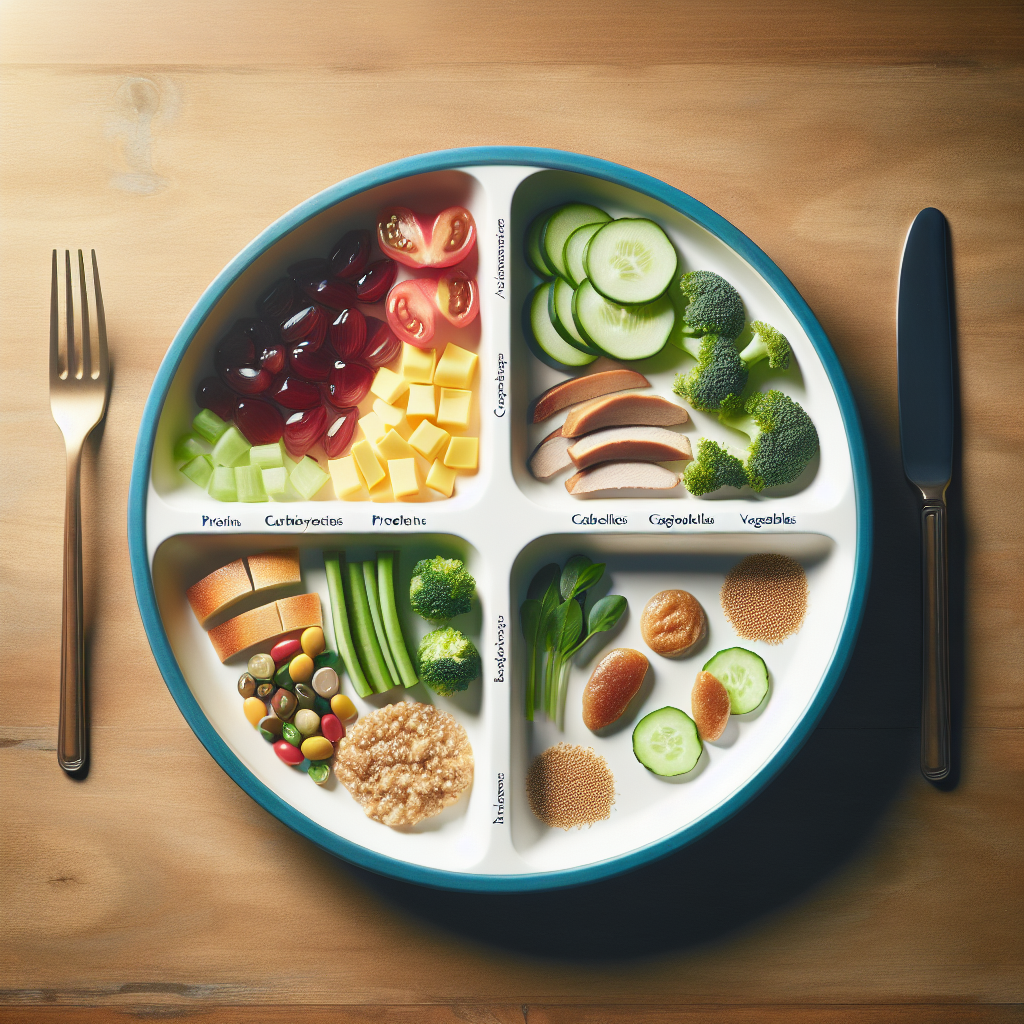Do you struggle with managing your diabetes and finding it difficult to maintain a balanced diet? Meal planning might be the solution you’ve been searching for. In this article, we’ll explore what meal planning entails and why it is crucial for effectively managing diabetes. By understanding the importance of meal planning, you can take control of your diet and improve your overall health. So, let’s dive into the world of meal planning and discover how it can positively impact your life with diabetes.

What is Meal Planning?
Definition of Meal Planning
Meal planning is the process of pre-planning and organizing meals and snacks for a specific period of time, typically a week or a month. It involves making a detailed list of the foods you will eat, creating a schedule for when you will eat them, and ensuring that your meals are balanced in terms of nutrition and portion sizes.
Purpose of Meal Planning
The purpose of meal planning is to help you make healthier food choices, manage your blood sugar levels, maintain a healthy weight, and simplify your overall meal preparation process. Meal planning can also be an effective tool for individuals with diabetes in managing their condition and preventing complications.
Components of Meal Planning
Meal planning consists of several key components that work together to help you achieve your health goals. These components include:
-
Food Selection: Choosing a variety of nutrient-rich foods from all food groups, including whole grains, lean proteins, healthy fats, and fruits and vegetables.
-
Portion Control: Determining appropriate serving sizes and portions to properly manage carbohydrate intake and maintain blood sugar control.
-
Balanced Nutrition: Ensuring that your meals are well-balanced with the right proportions of carbohydrates, proteins, and fats, as well as vitamins and minerals to maintain overall health.
-
Consistent Eating Schedule: Eating meals and snacks at regular intervals throughout the day to maintain steady blood sugar levels and prevent spikes or drops.
Overall, meal planning helps ensure that you are consuming a balanced and nutritious diet while managing your diabetes effectively.
Importance of Meal Planning for Managing Diabetes
Blood Sugar Control
One of the primary goals of meal planning for diabetes management is to maintain optimal blood sugar control. By planning your meals ahead of time, you can choose foods that are lower in carbohydrates, which can help prevent sudden spikes in blood sugar levels. Consistency in your eating schedule and portion sizes can also contribute to managing your blood sugar levels more effectively.
Portion Control
Portion control is crucial for individuals with diabetes to manage their carbohydrate intake, which directly affects blood sugar levels. By incorporating portion control into your meal planning, you can ensure that you are consuming the appropriate amount of carbohydrates and other nutrients, which can aid in maintaining stable blood sugar levels and overall health.
Balanced Nutrition
Meal planning allows you to focus on consuming a well-balanced diet, including a variety of foods from all food groups. This ensures that you are getting all the essential nutrients, vitamins, and minerals your body needs to stay healthy while effectively managing your diabetes. Balancing your meals also helps to prevent nutrient deficiencies and promotes overall well-being.
Weight Management
For individuals with diabetes, weight management is important for overall health and managing blood sugar levels. Meal planning can assist with weight management by helping you control portion sizes, choose nutrient-dense foods, and maintain a consistent eating schedule. By focusing on portion control and a balanced diet, meal planning can support your weight management goals.
Consistent Eating Schedule
Maintaining a consistent eating schedule is crucial for individuals with diabetes. Meal planning can help you establish a routine by scheduling meals and snacks throughout the day. This regularity ensures that your blood sugar levels remain stable and prevents overeating or skipping meals, both of which can lead to blood sugar spikes or drops. Having a consistent eating schedule also helps to regulate your metabolism and support overall health.
How to Start Meal Planning for Diabetes Management
Consulting a Healthcare Professional
Before starting meal planning for diabetes management, it is important to consult with a healthcare professional, such as a registered dietitian or certified diabetes educator. They can provide personalized guidance and recommendations based on your specific needs and health goals. A healthcare professional can help you understand your individual carbohydrate requirements, suggest appropriate portion sizes, and offer advice on food choices and preparation methods.
Setting Realistic Goals
When beginning meal planning, it is essential to set realistic goals that align with your lifestyle and dietary preferences. Consider your daily routine, personal preferences, and any dietary restrictions you may have. By setting achievable goals, you are more likely to stick to your meal plan long-term and experience success in managing your diabetes.
Understanding Carbohydrate Counting
Carbohydrate counting is a vital skill in meal planning for diabetes management. It involves estimating the amount of carbohydrates in your food and matching that with the appropriate insulin dose or medication. Educate yourself on carbohydrate counting techniques, which can include reading nutrition labels, using portion control tools, and learning about the carbohydrate content of different foods. This knowledge will help you make informed decisions about the foods you include in your meal plans.
Choosing the Right Foods
When meal planning for diabetes management, focus on choosing nutrient-dense foods that support your overall health. Select whole grain carbohydrates, lean proteins, healthy fats, and an abundance of fruits and vegetables. Aim for a variety of colors in your meals to ensure you are obtaining different vitamins and minerals. It is also essential to limit processed foods, sugary snacks, and beverages high in added sugars, as these can lead to blood sugar spikes and weight gain.
Creating a Meal Plan
Creating a meal plan involves organizing and scheduling your meals and snacks for a specific period, typically a week or a month. Start by determining the number of meals and snacks you require each day, considering personal preferences and dietary needs. Next, divide your plate to include appropriate portions of carbohydrates, proteins, and fats, and fill the remaining space with fruits and vegetables. Consider using online resources, meal planning apps, or simple pen and paper to create your meal plan.
Meal Prepping and Batch Cooking
Meal prepping and batch cooking can save you time and ensure that you have healthy meals readily available throughout the week. Set aside time each week to prepare larger quantities of staple foods, such as whole grains, proteins, and vegetables. Portion these foods into individual containers or meal-sized portions that can be easily reheated and enjoyed later. This method allows you to have nutritious meals on hand, reducing the temptation to eat unhealthy options or rely on takeout.
Smart Snacking
Incorporating smart snacking into your meal planning is crucial for managing blood sugar levels and preventing excessive hunger between meals. Choose nutrient-dense snacks that are low in added sugars and contain a good balance of carbohydrates, proteins, and fats. Some examples include fresh fruits, Greek yogurt, nuts and seeds, whole grain crackers with hummus, or vegetables with a healthy dip. By incorporating satisfying and nutritious snacks into your meal plan, you can maintain stable blood sugar levels and prevent overeating during meals.
Techniques and Strategies for Successful Meal Planning
Plate Method
The plate method is a portioning technique that simplifies meal planning and promotes balanced nutrition. The plate is divided into sections: one-half for non-starchy vegetables, one-quarter for lean proteins, and one-quarter for whole grains or starchy vegetables. This method emphasizes portion control and encourages the consumption of nutrient-dense foods.
Glycemic Index
The glycemic index (GI) is a ranking system that measures how quickly carbohydrates in foods raise blood sugar levels. Foods with a low GI value are digested and absorbed more slowly, resulting in a slower and more gradual rise in blood sugar levels. Incorporating low GI foods into your meal planning can help promote more stable blood sugar control.
Exchange Lists
Exchange lists provide a method for meal planning by grouping similar foods together based on their macronutrient content. Foods within the same group are considered interchangeable in terms of their effect on blood sugar levels. By using exchange lists, you can create balanced meals while keeping track of your carbohydrate intake accurately.
Proper Portioning
Proper portioning is key to managing blood sugar levels and maintaining a healthy weight. Use visual cues, measuring cups, or a food scale to accurately portion your meals and snacks. Being aware of appropriate portion sizes helps you control carbohydrate intake and avoid overeating.
Label Reading
Reading nutrition labels is an important skill for successful meal planning. Pay attention to the serving size, total carbohydrates, and added sugars listed on the label. This information will help you make informed decisions about the foods you choose and ensure they align with your dietary needs.
Restaurant and Social Dining Tips
Eating out or attending social events can present challenges when it comes to meal planning for diabetes management. However, with some planning and preparation, it is possible to make healthier choices in these situations. Research restaurant menus ahead of time, choose grilled or baked options over fried foods, and ask for dressings and sauces on the side. When dining with others, communicate your dietary needs, and suggest alternative venues or recipes that accommodate your meal plan.
Managing Stress and Emotional Eating
Stress and emotional eating can significantly impact your ability to stick to your meal plan and manage your diabetes effectively. Find healthy ways to manage stress, such as engaging in physical activity, practicing relaxation techniques, or seeking support through therapy or counseling. Recognize triggers for emotional eating and develop alternative coping strategies, such as journaling, talking to a friend, or engaging in a hobby.

Tips for Effective Meal Planning
Creating a Grocery List
Before you embark on your meal planning journey, create a comprehensive grocery list to ensure you have all the necessary ingredients on hand. Take inventory of your pantry, fridge, and freezer, and make note of any staple foods or items that need replenishing. Having a well-organized grocery list will save you time, prevent impulse buying, and ensure you have everything you need to follow your meal plan.
Meal Planning Apps and Tools
Take advantage of meal planning apps and tools available to simplify the process. These apps can provide you with a variety of recipes based on your dietary preferences, generate shopping lists, and even calculate detailed nutrition information. Utilizing technology can make meal planning more efficient and enjoyable.
Utilizing Leftovers
Make use of leftovers to enhance your meal planning efforts. Cook larger quantities of your main dishes and divide them into individual portions for future meals. Leftovers can be easily incorporated into your meal plan as a quick and convenient option for days when you are short on time or don’t feel like cooking.
Variety and Flexibility
Maintaining variety and flexibility in your meal plan is essential for long-term success. Incorporate a wide range of foods and flavors to keep your meals interesting and enjoyable. Allow for flexibility by including days when you dine out or enjoy a special treat. This flexibility helps prevent feelings of deprivation and promotes sustainability.
Involving the Family
Meal planning can become a family affair, involving everyone in the household. Engage your family members in the process by asking for their input, allowing them to choose some meals or snacks, and involving them in the preparation and cooking. This not only encourages healthy eating habits but also fosters a sense of togetherness and shared responsibility.
Budgeting and Saving Money
Meal planning can also help you save money by preventing food waste and reducing the need for takeout or dining out. Plan your meals around ingredients that are on sale or in season, and look for cost-effective alternatives to expensive ingredients. Consider bulk buying certain items to take advantage of discounts and reduce costs in the long run.
Common Challenges and Solutions in Meal Planning for Diabetes
Time Constraints
One of the most common challenges in meal planning is lack of time. Balancing work, family, and other responsibilities can make meal planning seem overwhelming. However, there are ways to overcome this challenge. Set aside dedicated time each week for meal planning and preparation. Utilize meal prepping techniques to make meals in advance and freeze them for later use. Consider purchasing pre-cut vegetables or utilizing shortcuts like frozen fruits and vegetables to simplify the cooking process.
Lack of Motivation
Maintaining motivation to stick to your meal plan can be challenging, especially when faced with cravings or temptations. To combat this, find ways to stay motivated and accountable. Set small achievable goals, reward yourself for your successes, and find support through friends, family, or online communities. Remind yourself of the benefits of meal planning and how it positively impacts your diabetes management.
Food Cravings and Temptations
Managing food cravings and temptations is a common obstacle in meal planning. To overcome this challenge, find healthier alternatives to satisfy your cravings. Find recipes for healthier versions of your favorite dishes or explore new flavors and cuisines to keep your meals exciting. Practice mindful eating by anticipating and acknowledging your cravings without giving in to unhealthy options.
Social Events and Eating Out
Social events and dining out can make sticking to your meal plan more difficult. However, with some planning and preparation, you can still make healthy choices in these situations. Research restaurant menus ahead of time and look for healthier options. Communicate your dietary needs to the host or restaurant staff, and consider bringing a dish or two that aligns with your meal plan. Focus on the social aspect of the event rather than solely on the food.
Traveling
Traveling can pose challenges for meal planning, but it is not impossible to maintain your routine. Plan your meals and snacks in advance, and pack healthy options for the journey. Research local grocery stores or restaurants at your destination that offer healthier choices. Plan your meals around local cuisine and find creative ways to incorporate physical activity into your travel plans.

Benefits of Meal Planning for Diabetes Management
Improved Blood Sugar Management
One of the greatest benefits of meal planning for diabetes management is improved blood sugar control. By choosing the right foods, paying attention to portion sizes, and maintaining a consistent eating schedule, you can keep your blood sugar levels within target range and reduce the risk of diabetes-related complications.
Enhanced Weight Control and Management
Effective meal planning can support your weight control and management goals. By focusing on portion control, choosing nutrient-dense foods, and incorporating regular physical activity, you can achieve and maintain a healthy weight. This, in turn, can improve insulin sensitivity and reduce the risk of obesity-related complications.
Increased Nutritional Awareness
Meal planning encourages you to be more mindful of your nutritional needs and make informed food choices. By understanding macronutrient content, portion sizes, and the importance of a balanced diet, you develop a greater awareness of your nutritional requirements. This knowledge empowers you to make healthier choices that support your overall health and diabetes management.
Simplified Grocery Shopping
Meal planning streamlines the grocery shopping process. When you have a detailed meal plan in hand, you can create a comprehensive shopping list, ensuring you have all the ingredients you need for your meals and snacks. This eliminates the need for frequent trips to the grocery store and reduces food waste as you only purchase what you will consume.
Reduced Stress and Decision-Making
With a meal plan in place, you no longer have to make last-minute decisions about what to eat. Meal planning alleviates the stress of constantly thinking about meals, especially for individuals with diabetes who need to consider their blood sugar control. By knowing what you will eat in advance, you can focus on other aspects of your life without feeling overwhelmed by constant decisions.
Conclusion
Meal planning is a valuable tool for managing diabetes effectively. By carefully selecting nutritious foods, controlling portion sizes, and maintaining a consistent eating schedule, you can achieve optimal blood sugar control, manage your weight, and improve your overall health. The techniques, strategies, and tips discussed in this article provide a roadmap for successful meal planning while considering common challenges and reaping the numerous benefits. Consult with healthcare professionals, involve your family, and utilize tools and resources to make meal planning an enjoyable and sustainable part of your diabetes management journey. With proper meal planning, you can take control of your health and well-being.


